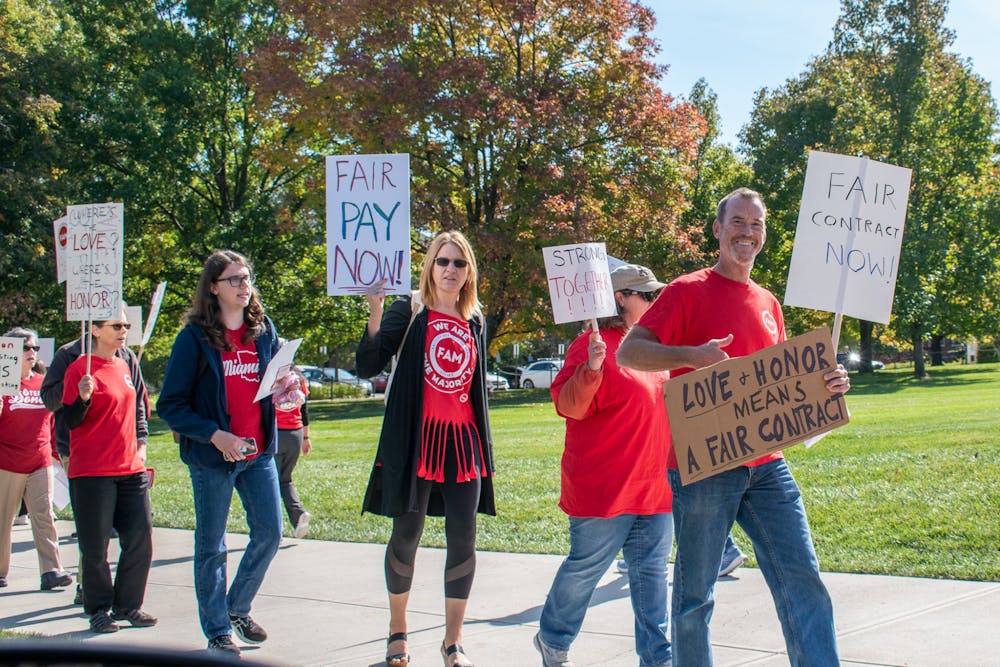For union members across the country, the upcoming election cycle presents the opportunity for change and challenges as it relates to union organization and structure.
In an email to The Miami Student, Sarah Kilpatrick, executive director of the Ohio Conference AAUP (American Association of the University Professors) laid out potential implications for Ohio unions.
“At the state level, there are very clearly pro-union and anti-union lawmakers,” Kilpatrick said. “One of the biggest reasons why Senate Bill 83 has not passed the legislature is because it is the most anti-union bill we’ve seen in over a decade.”
Senate Bill 83 (S.B. 83) is a controversial bill that aims to modify educational policies related to university classroom instruction and academic content. Cathy Wagner, FAM contract team co-chair and English professor at Miami University, also noted the potential implications of S.B. 83 for unions and labor.
“S.B. 83 is a bill that would be very harmful to academic unions,” Wagner said. “It would block collective bargaining rights in multiple ways. It would also affect faculty academic freedom.”
Kevin Reuning, an associate professor of political science, emphasized the impact of S.B. 83 on the upcoming election and unions.
“If you look at S.B. 83, one of the few things that was removed was some of the language limiting collective bargaining,” Reuning said. “I think this kind of reflects the fact that there are still some Republicans in the Ohio legislature that are more union-friendly than others nationally.”
Wagner also said Issue 1, an amendment aimed at combating gerrymandering by redrawing the boundaries of electoral districts, could play a key role for both FAM and unions more broadly.
“The other thing that is hugely important for FAM and for unions at large is that we pass Issue 1,” Wagner said. “If Issue 1 passes, then we can have fairer elections in Ohio … and take some of the extremism out of politics.”
On the national level, there are crucial appointments on the table.
Kilpatrick said at the federal level, whoever wins the presidency will be able to appoint members to the National Labor Relations Board (NLRB), which makes decisions about unions. She added that President Joe Biden’s NLRB choices have been very pro-union, and believes Kamala Harris would follow that lead. On the other hand, another Trump presidency would lend itself to more anti-labor NLRB board members.
Reuning emphasized that a crucial aspect of this election will be the NLRB.
Enjoy what you're reading?
Signup for our newsletter
“The current general counsel, Jennifer Abruzzo, has been much more sympathetic under Biden,” Reuning said. “They’re able to shift how companies are sanctioned for different things. [Abruzzo] has taken a more aggressive approach to sanctioning companies that are breaking NLRB rules over union drives. If Harris is elected, I would expect that to continue.”
Kilpatrick shared a similar sentiment about a potential Harris versus Trump administration, saying another Trump presidency would result in more anti-labor NLRB board members, while Harris would likely follow Biden’s lead.
Kilpatrick, Reuning and Wagner all said they believe this is a crucial moment in time for unions across the country, with Reuning saying that the diversity of unions could lead to an overall political splinter.
“When we think of unions, I think people need to think of a significantly more diverse set of people than they have in the past,” Reuning said. “We’re seeing that in divisions of labor … Some unions have more conservative membership and are shifting more on cultural issues. Whereas others are going to be the heart of the democratic party for the foreseeable future, we might see a splintering of unions in the next four to eight years.”
Wagner said while union support is increasing, overall density is still in decline.
“Even though 70% of the US population now says that they support unions, there is so much union busting that it’s hard to form one,” Wagner said.
Kilpatrick said while she doesn’t think that union issues were at the forefront of this election, Americans are still in support of labor.
“Every poll I’ve seen shows that a strong majority of Americans favor unions,” Kilpatrick said. “From my perspective, union issues have not been front and center in this election cycle. Nevertheless, union organizations have actively been supporting and promoting pro-worker candidates.”




